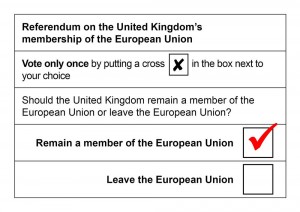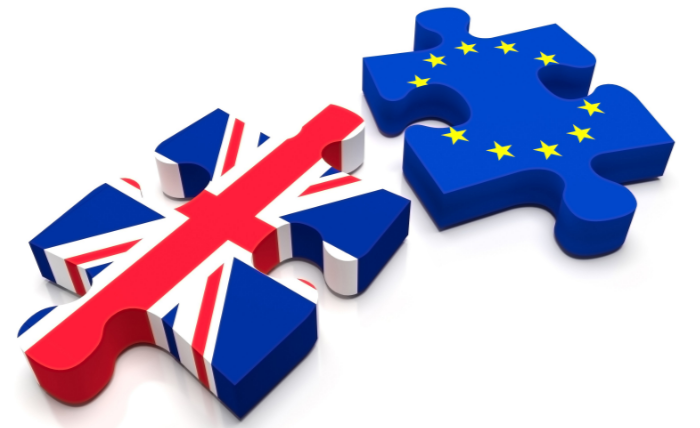UPDATE 9:06 pm PT 24 Jun 2016: Results are out. Brexit Wins: UK Out of EU. Prime Minister Is Likely Next
aNewDomain — It’ll be a few hours before official UK election results are out, but a YouGov exit poll indicate British voters have voted to keep Britain in the UK.
British voters were asked “Should the United Kingdom remain a member of the European Union or leave the European Union?” earlier today. Exit polls suggest voters decided to remain in the EU by a narrow margin: 52 percent voted to stay, 48 percent voted to go.
“The results are close and it is too early to call definitely,” YouGov’s head of social and political research said an hour ago. “But these results, along with the recent trends and historical precedent, suggest a Remain victory is the more likely outcome.”
 Another poll conducted yesterday, from IPSOS-MORI, reported similar results: 54 percent in the Remain category, 42 percent out.
Another poll conducted yesterday, from IPSOS-MORI, reported similar results: 54 percent in the Remain category, 42 percent out.
“It looks like Remain will edge it,” anti-EU UK Independence party leader Nigel Farage, told Sky News shortly after polls closed at 10 p.m. in Britain. Farage later updated his remarks to say that the UKIP’s fight to leave the EU will go on.
A few reports indicate that a private poll taken by UKIP showed that Leave narrowly won the Brexit referendum.
Official results will take hours to count, so Americans probably won’t see final results until tomorrow morning EDT. In UK’s overseas territory Gibraltar, the votes are already in: The Remain vote was no contest, 95.9 percent voted to keep the UK in the EU.
Members of Britain’s Conservative Party especially have complained for years about the EU’s stultifying bureaucracy and its regulation-happy leaders.
It’s the first time in 41 years that anyone has asked UK citizens to weigh in on EU membership
But in 2008, the Euro financial crisis confirmed the party’s worst fears. Now that the Conservative Party is in charge, Prime Minister David Cameron has held its Remain or Go referendum.
Britain joined the European Communities (EC), also known as the Common Market, in 1973. Two years later, British citizens voted 67 percent in favor of staying in the organization. Labour Prime Minister Harold Wilson and future Conservative Prime Minister Margaret Thatcher were big supporters of the idea at the time.
In 1993, the UK became an EU founding member, based on a decision from fully two decades before.
Cameron, who initially only wanted to adjust the terms around EU membership, announced today’s EU referendum in February. Cameron did renegotiate Britain’s membership with EU bureaucrats. Yet Cameron now is in favor of remaining in the EU, a factor that undoubtedly fueled the current Brexit debate.
Cameron’s own party and Britain itself is divided on the issue. The UK Labour Party was generally in favor of remaining in the EU, as was the smaller Liberal Democrat Party.
The Scottish National Party, the third largest political party in the British House of Commons, was so in favor of remaining in the EU that party leaders warned that a departure from the EU would trigger an immediate independence referendum. Scotland voted to stay in the UK by a narrow 55% remain/45% leave vote conducted under the assumption that the UK would stay in the EU.
Brexit: A closer look
Leave campaigners including former London mayor Boris Johnson have routinely pointed to frightening statistics about the number of regulations sent to Britain each year by the EU and the cost of EU membership to Britain.
Check out the video below. It offers a fairly non-partisan summary of the situation:
Well-known BBC journalist Jeremy Paxman explained Brexit in a recent documentary, concluding that the concept of national sovereignty was basically misunderstood. The relationship between the UK and EU, as he notes in the video below, is far more complicated than how domestic and international media typically portrays it.
The video below, from BBC Newsnight, discusses the effects Brexit might have on real UK citizens.
Here’s a long interview that former London Mayor Boris Johnson gave to the BBC on Brexit.
The Official US Position on Brexit
In April, U.S. Pres. Barack Obama was labeled a “hypocrite” for urging Britain to stay in the European Union by London mayor Boris Johnson.
Obama’s April visit to Britain included a joint press conference with David Cameron where Obama reiterated his earlier remarks on the Brexit referendum.
Long-time Euro skeptic Nigel Farage, the leader of the UKIP party thought Obama’s comments were more geared to the president’s own personal future as a corporate consultant than US national policy. Here’s his take on Obama’s comments:
For aNewDomain, I’m Tom Ewing.
Cover image: Tom Ewing for aNewDomain Media, All Rights Reserved; Brexit image inside: MSResearch, All Rights Reserved.













